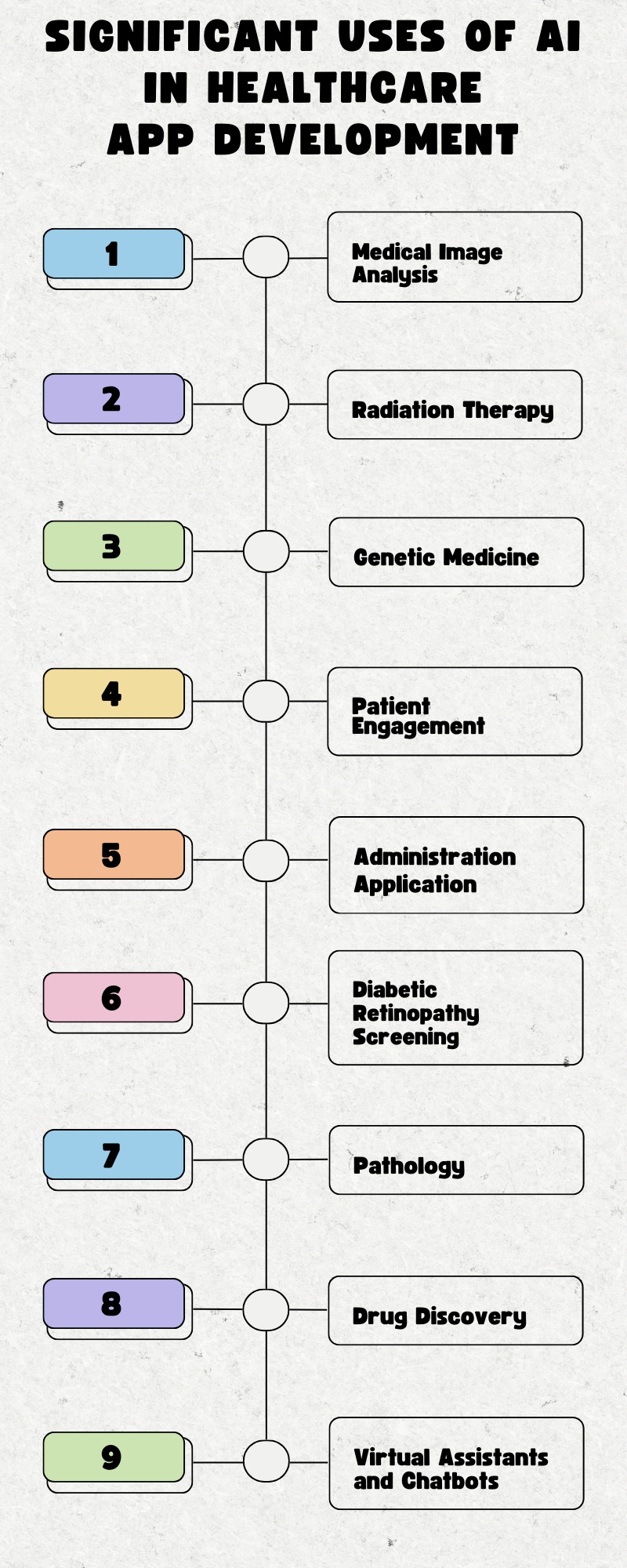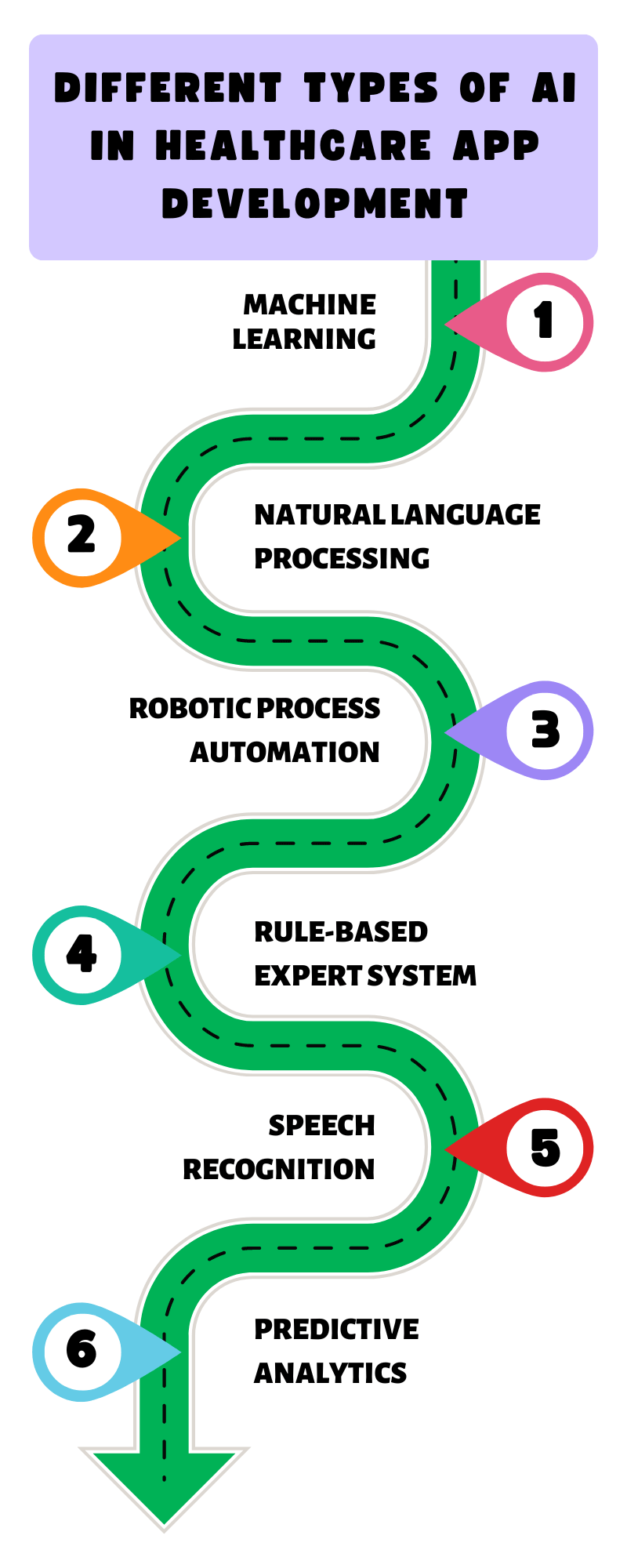Table of Contents
The advent of AI in healthcare is endorsed with metamorphic changes. The possibilities that AI and robotics have in the healthcare industry are extensive. Witnessing the change, healthcare practitioners are training cognitive technology and enabling a futuristic approach with accuracy. The modernized systems are trained to assess patient data and forecast pattern-based disorders based on their medical history.
The hardship posed by the lack of medical resources accosted the urgency of AI in healthcare. Numerous healthcare providers and associations began incorporating AI-enabled technologies, such as algorithms, to monitor and research patients. Gratitude to contemporary improvements catapulted by the ever-evolving need for intelligent technology, generative AI in healthcare remodeled the sector.
AI applications in healthcare and life sciences have expedited drug research and discovery innovations, enabled instantaneous diagnoses, and facilitated efficacy in industry operations. With machine learning standards, practitioners assess the medical data gathered through tools like Big Data, which can be examined, and patterns emanated that enhance patient results. The standardized inventive innovation of AI in healthcare marks the beginning of an automated future.
Market Overview of Artificial Intelligence in the Healthcare Industry
Applications of AI in healthcare have restructured contemporary operations. According to CB Insights, 86% of healthcare companies, life science businesses, and tech providers use AI in healthcare. CB Insights also reported that investment in telemedicine app development, from health education services to remote patient monitoring and doctor-patient consultations, was boosted by nearly 300%.
Such high figures prove opportunities for artificial intelligence in healthcare and its effectiveness for the industry in the upcoming times. The trend has been augmented by the fact that AI in healthcare systems is anticipated to respond independently to patient-specific difficulties by 2025. Intelligent technologies are adopting a forward-thinking approach and changing the nature of standard functioning.
Future of AI in Healthcare Industry
Think about a tomorrow where medical instruments and procedures are AI-powered to examine MRIs and X-rays and predict the requirements of healthcare specialists to operate on a patient. Imagine a future where an extensive amount of healthcare data is transformed into actionable and valuable insights, and the patient results are prescribed based on them. AI in healthcare welcomed technological advancements in the industry to offer expansion in recent years and transformed old medical practices.
Nevertheless, some concerns still restrict the adoption of AI in healthcare as challenges impede the advancement process. One primary challenge the industry encounters is the absence of professional specialists, which leads to development uncertainties, errors, and increased capital investments. Healthcare providers and established hospitals divert to healthcare app development services for expertise in adopting AI and building user-friendly experiences.
Significant Uses of AI in Healthcare App Development

Healthcare and artificial intelligence support diverse medical procedures. Other AI applications in healthcare guarantee more rapid techniques, fulfill workforce requirements, enhance patient satisfaction, and lower expenses. Considering the multiple uses of AI in healthcare app development, let us examine the rise of artificial intelligence in healthcare applications.
1. Medical Image Analysis
One of the the benefits of AI in healthcare is medical imaging analysis, where an AI-powered app authorizes radiologists and to examine X-rays MRIs with accuracy by saving time. Medical image analysis entrusts them to detect abnormalities, disorders, and irregularities, evading mistakes in the examination and offering an accurate diagnosis.
2. Radiation Therapy
Healthcare apps gather patients’ electronic health records (EHR) to alter their cancer remedies through radiation treatment using AI in healthcare. AI identifies old documents to assist healthcare practitioners in making informed judgments concerning radiation quantity, safeguarding healthy cells, and enhancing the security and efficacy of radiation therapy.
3. Genetic Medicine
One of the progressive uses of AI technology in healthcare is to contrive and create medicine for genetic disorders. It investigates genomic datasets and anticipates any adjustments leading to disease, permitting healthcare providers to customize their medicine and treatment procedures.
4. Patient Engagement
AI in healthcare app development is being utilized to improve patient engagement and construct competent judgments about their health. Standard features like appointment reminders, personalized health information repositories, and customized content enhance patient satisfaction.
5. Administration Application
Admin AI healthcare applications automate the repetitive functional tasks of clinics, hospitals, or other healthcare establishments. AI features that are used include resource allotment, appointment scheduling according to doctors’ availability, invoice management, and patient document management.
6. Diabetic Retinopathy Screening
AI in healthcare apps can serve as cost-effective diabetic retinopathy detection instruments, administering the premature elimination of vision failure in diabetic patients. They examine retinal photos to identify more-than-mild diabetic retinopathy (mtmDR) and the premature indications of a diabetic eye condition.
7. Pathology
With AI and ML abilities, healthcare service providers can diagnose medical images and photographs, reports, etc., to assist in determining test irregularities. The use of AI in healthcare authorizes doctors to offer examinations with the maximum accuracy.
8. Drug Discovery
The AI-driven platform incorporates the capability of biology, data science, and chemistry to examine the drug imprints and determine their mechanism and functionality. AI applications in healthcare display exceptional accuracy in reimagining pharmaceutical creation.
9. Virtual Assistants and Chatbots
One considerable use of artificial intelligence in healthcare is developing or incorporating virtual aids or AI-powered chatbots into healthcare products. With a chatbot app development company, hospitals build healthcare apps that permit patients to organize appointments or ask healthcare-related queries. Healthcare and medical service providers can quickly update the availability of doctors and medical data. Hence, it makes life processes manageable for both patients and admins.
Different Types of AI in Healthcare App Development

The growing needs and expectations regarding AI uses in healthcare have given rise to diverse types. AI alters important factors that ensure smooth operational functioning, including navigating investigators, simplifying administrative procedures, and enhancing patient care. Healthcare practitioners can choose AI development services to build AI-powered solutions using the below-mentioned technologies.
1. Machine Learning
Next-gen products utilize Machine learning, one of the most discussed AI technologies, to train prototypes with patient data and information. Deep learning and neural networks, the subfields of ML, are the two intricate facets utilized for healthcare analysis and forecasting consequences.
The standard ML practice in healthcare apps is training datasets and information feasible to thrive for medical accuracy, like suggesting treatment objectives and plans.
2. Natural Language Processing
With speech recognition, text analysis, and translation, NLP comprehends human language or data compiled in structures other than numerical and pattern structures. Healthcare apps utilize NLP to understand and categorize medical documentation, study information for notations and information, and aid customers with conversational AI.
3. Robotic Process Automation
Robotic process automation utilizes programs on servers to observe scripts or rules to automate hospital workflow, making the procedure intelligent. Healthcare apps utilize RPA to automate everyday administrative operations like invoice generation, revamping patient histories and approval, and improving functioning efficacy and productivity.
4. Rule-Based Expert System
These are the standard ‘if-then’ rules-based practices used in healthcare for clinical decision-making. Creating this system required human expertise and a set of rules. However, this method is being replaced by better ML practices and algorithms due to its time-consuming nature and the probability of rule conflict.
5. Speech Recognition
Speech recognition deciphes human speech into a documented form, eradicating the necessity for manual details entry in AI in healthcare. The AI healthcare application facilitates conversational AI to decrease on-paper work and human mistakes, saving time and energy.
6. Predictive Analytics
This sub-category of ML and AI in healthcare uncovers patterns and interconnections in data to forecast forthcoming consequences. Physicians, clinics, or other healthcare experts utilize this technology to recognize treatment strategies based on signs.
Moreover, it can decide when the infirmaries or clinics are extensively loaded, inform upcoming check-ins, and optimize meeting scheduling and adequate staff arrangement.
Estimated Cost of AI in Healthcare App Development Services
The healthcare app development cost while adopting AI depends on multiple factors like the size of the team, the application’s complexity, the location of the development team, etc. The moderate cost of developing an AI app for the healthcare industry can vary from $350,000 to $150,000 and go higher according to multiple factors.
Considering the development process of an AI-powered healthcare app, the cost is depicted in the segment below:
| Development Stage | Estimated Cost |
| Market Research | $1500-$5500 |
| Design | $5000-$25,000 |
| Front-end Development | $15,000- $40,000 |
| Back-end Development | $20,000-$45,000 |
| Development | $25,000-$65,000 |
| Quality Assurance | $15,000-$20,000 |
| Deployment and Launch | $5500-$15,000 |
| Post- Development | $5000-$25,000 |
What Makes AppsChopper Different as an AI Development Company
AI and healthcare go hand in hand, considering the technology’s numerous advantages to the industry. Artificial intelligence alters healthcare by converting it into a more intelligent, productive, and patient-centric industry. Incorporating AI in healthcare can improve diagnostic precision, simplify administrative chores, optimize resource allotment, and enhance treatment results.
Nevertheless, some limitations inhibit the practical utilization of intelligent AI solutions in the healthcare industry. Collaborating with a custom app development company like AppsChopper can assist healthcare providers in overpowering those challenges and creating more precise drug discovery, diagnoses, and treatment plans.








